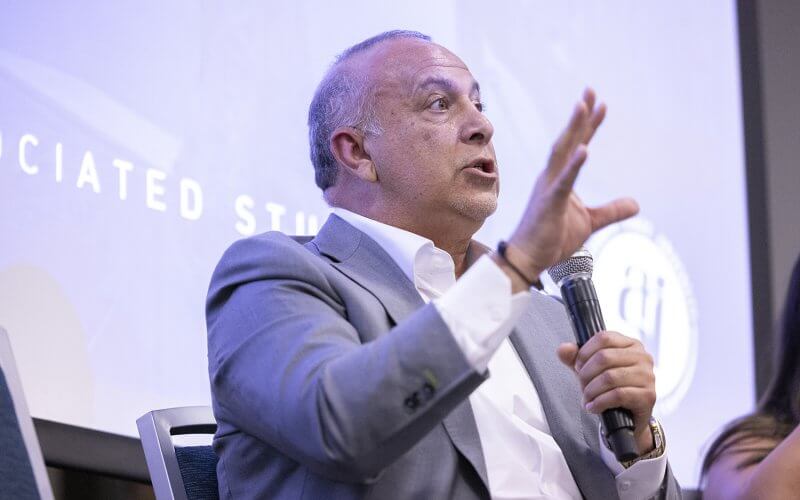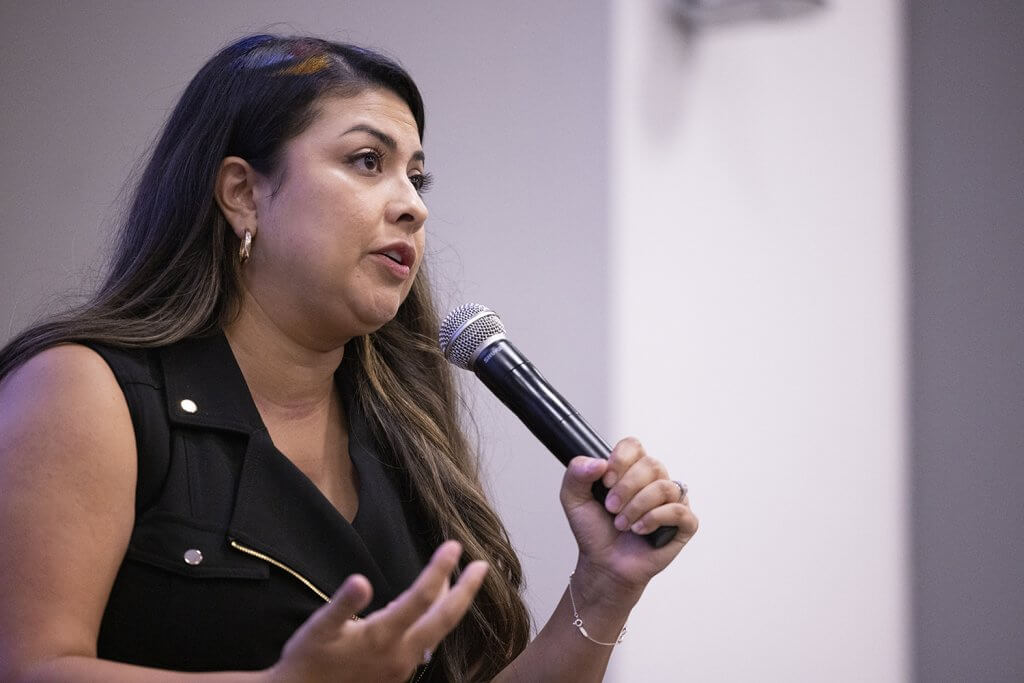
To boost civic engagement and voter participation ahead of the Nov. 5 general election, Cal State Fullerton invited nationally recognized political consultant Mike Madrid to speak with faculty, staff and students about the impact of the Latino vote.
At the Sept. 19 event, Madrid shared research from his newest book, “The Latino Century: How America’s Largest Minority Is Transforming Democracy,” which investigates why political parties have failed to capture the Latino vote. The event was hosted by CSUF student organizations Pi Sigma Alpha and Political Science Student Association in partnership with the Office of Government and Community Relations.
Madrid emphasized the pivotal role that Latino voters will play in the direction of the election as 20% of Latinx people in the U.S. will be voting for the first time, including many CSUF students. The university was designated a Hispanic-Serving Institution by the U.S. Department of Education in 2004 for enrolling more than 25% Latinx students. Today, Latinx students comprise approximately 52.3% of the student population.
“The Latino vote will be bigger than the winning margin in every single battleground state,” said Madrid. “One of the key factors here is the emergence of third- and fourth-generation Latino voters.”
Historically, Latino voters have voted in favor of the Democratic Party, but in recent years, Madrid said their group voting behavior has changed significantly as new generation voters have different priorities, political opinions and needs than those before them. This shift in political perspective has resulted in more Latino people voting increasingly against both parties.
“Eighty percent of the U.S. Latino population is U.S. born, most of it third generation, and increasingly, fourth generation. This is an extraordinarily different Latino voter,” said Madrid. “The vote and voting behavior is moving markedly away from issues that are defined by ethnicity and race, like immigration, and toward this economic populist, pocketbook issue.”
Madrid said that one of the reasons for this shift is that politicians and their campaigns have failed to address systemic issues that the population cares about. For example, he said the housing crisis and lack of affordable housing in the state has led Latinos to generational poverty, affecting their health, ability to pursue higher education and success in the business industry.
“As a community of Latinos, we are more driven and motivated from a political perspective by economics. We are largely working class people,” said Madrid. “My book argues that Latino leaders need to start looking at all of the commonalities we have, primarily class-based, and listen to the voters who have been telling them for decades that it is time to develop an agenda that is going to pull people out of poverty as a primary motivating force for our political engagement.”
From CSUF to Capitol Hill
Madrid was joined by CSUF alumna Aissa Canchola Banez ’13 (B.A. political science and American studies), who launched her career in national politics as a student leader in Associated Students Inc. and the Cal State DC Scholars program.
“I was a student leader on campus for several years, and it was ASI that took me to D.C. for the first time,” said Banez. “It was such an amazing experience because we were doing lobbying and advocacy visits at a time when California was making critical budget decisions.”

During that trip, Banez realized that she wanted to work on education policy that supports and uplifts Latinx communities and students. After graduating, she spent more than a decade working on Capitol Hill for the United States Senate Committee on Health, Education, Labor and Pension. Today, she is the director of policy for the Student Borrower Protection Agency, a nonprofit organization that engages in advocacy, policymaking and litigation strategy to advance economic opportunities for students.
Canchola agreed that economic issues have become a priority for third-generation voters. She underscored that the “policies at the national level are not representative of the Latino population,” and she’s working to ensure that Latinx communities and other communities of color are not disproportionately affected by such economic issues as debt.
“The work I do now is really central to creating policies that make an economy that works for working class people,” said Banez.